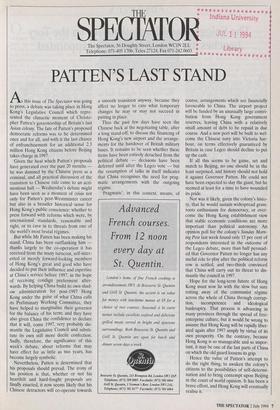S P ECI E /XI'
The Spectator, 56 Doughty Street, London WC1N 2LL Telephone: 071-405 1706; Telex 27124; Fax 071-242 0603
PATTEN'S LAST STAND
Athis issue of The Spectator was going to press, a debate was taking place in Hong Kong's Legislative Council which repre- sented the climactic moment of Christo- pher Patten's governorship of Britain's last Asian colony. The fate of Patten's proposed democratic reforms was to be determined once and for all, and with it the last chance of enfranchisement for an additional 2.3 million Hong Kong citizens before Beijing takes charge in 1997.
Given the heat which Patten's proposals have generated over the past 20 months he was damned by the Chinese press as a criminal, and all practical discussion of the transition to Chinese rule came to an acri- monious halt — Wednesday's debate might have been seen as a moment of crisis not only for Patten's post-Westminster career but also in a broader historical sense for Hong Kong's public conscience: whether to press forward with reforms which were, by international standards, reasonable and right, or to cave in to threats from one of the world's most brutal regimes.
But while Mr Patten has been making his stand, China has been outflanking him thanks largely to the co-operation it has received from the many turncoat, self-inter- ested or merely forward-looking members of Hong Kong's great and good who have decided to put their influence and expertise at China's service before 1997, in the hope of receiving condign preferment after- wards. By helping China build its own shad- ow administration for post-1997 Hong Kong under the guise of what China calls its Preliminary Working Committee, they have helped to marginalise their governor for the balance of his term; and they have also given China the confidence to declare that it will, come 1997, very probably dis- mantle the Legislative Council and substi- tute its own still more docile confection. Sadly, therefore, the significance of this week's debate, about reforms that may have effect for as little as two years, has become largely symbolic.
Nevertheless, Patten is determined that his proposals should prevail. The irony of his position is that, whether or not his heartfelt and hard-fought proposals are finally enacted, it now seems likely that his Chinese detractors will co-operate towards a smooth transition anyway, because they affect no longer to care what temporary changes he may or may not succeed in putting in place.
Thus the past few days have seen the Chinese back at the negotiating table, after a long stand-off, to discuss the financing of Hong Kong's new airport and the arrange- ments for the handover of British military bases. It remains to be seen whether these items have been entirely detached from the political debate — decisions have been deferred until after the Legco vote — but the resumption of talks in itself indicates that China recognises the need for prag- matic arrangements with the outgoing regime.
`Pragmatic', in this context, means, of course, arrangements which are financially favourable to China. The airport project will be funded by an unusually large contri- bution from Hong Kong government reserves, leaving China with a relatively small amount of debt to be repaid in due course. And a new port will be built to wel- come the Chinese navy into Victoria har- bour, on terms effectively guaranteed by Britain in case Legco should decline to put up the cash.
If all this seems to be game, set and match to Beijing, no one should be in the least surprised, and history should not hold it against Governor Patten. He could not have been expected to slay the giant, but he seemed at least for a time to have wounded its pride.
Nor was it likely, given the colony's histo- ry, that he would sustain widespread grass- roots enthusiasm for democracy, or over- come the Hong Kong establishment view that stable economic conditions are more important than political autonomy. An opinion poll for the colony's Sunday Morn- ing Post last week found only 15 per cent of respondents interested in the outcome of the Legco debate, more than half persuad- ed that Governor Patten no longer has any useful role to play after the political reform row is settled, and two-thirds convinced that China will carry out its threat to dis- mantle the council in 1997.
Hope for the long-term future of Hong Kong must now lie with the slow but sure rotting away of the communist regime across the whole of China through corrup- tion, incompetence and ideological bankruptcy. That process is advancing in many provinces through the spread of free- enterprise culture, but it would be wrong to assume that Hong Kong will be rapidly liber- ated again after 1997 simply by virtue of its own prosperity. On the contrary, because Hong Kong is so manageable and so impor- tant, it may be one of the last parts of China on which the old guard loosens its grip. Hence the value of Patten's attempt to do the right thing, to awaken the colony's citizens to the possibilities of self-determi- nation and to bring contempt upon Beijing in the court of world opinion. It has been a brave effort, and Hong Kong will eventually realise it.


























































 Previous page
Previous page